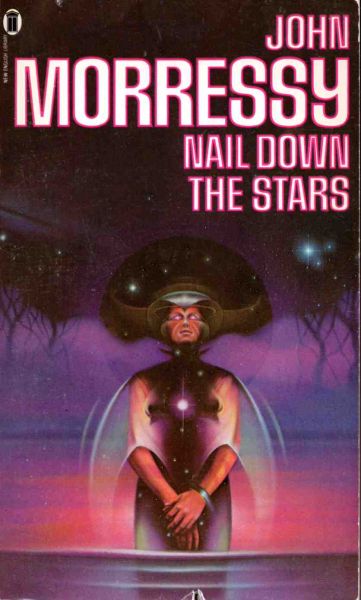Apparently, this was “SF novels about nomadic actors” week
Nail Down the Stars (Del Whitby, volume 2)
By John Morressy

6 Jun, 2015
0 comments
John Morressy (1930 – 2006) was a prolific author, publishing more than two dozen novels over the course of a two-generation career. Nevertheless, 1973’s Nail Down the Stars is the first novel by Morressy I’ve ever read. Despite the fact that local used bookstores are oddly well stocked with mass market SF of the 1970s and 1980s [1], I had to resort to ordering this book from AbeBooks via the interwebs. Obviously I am guiltless of authorial neglect, as he seems to be one of those authors whose books didn’t make it to the hinterland of Waterloo Country [2].
Career criminal and conman Kynon Gallamor wasn’t the kind of man to hide from heavy hitters like Orcull and his henchmen. That is why this book is not about Kynon, but about his orphan son Jolon. To save his grandson from the excessively diligent Orcull, Faxon Gallamor arranges to apprentice Jolon to an off-world merchant. It’s a pity that Orcull is determined enough to ensure that the merchant’s ship explodes soon after launch.
It’s a pity for the merchant, that is, because Jolon had no intention of spending his life in commerce. Before the doomed merchant headed up and out on his final trip, Jolon had already stowed away on the Triboulet. Adopting a new and less-targeted name, he becomes the most junior member of Prospero’s Original Galactic Circus.
The life of wandering players is a hazardous one; the 27th century knows no central authority, no lens-bearing Patrol, no Galactic Empire. Each ship is potentially victim to pirates and raiders. Even planets offer no real security. Happy communities never know if the next ship will be peaceful, or full of slavers and murderous bandits.
Jolon’s flight from home and his former identity sets the pattern of his new life. Jolon is genuinely skilled as a singer and playwright. As one of the few literate men in an age of ignorance and illiteracy, he is uniquely placed to plunder the forgotten literature of the past. Playwright, doting husband, grieving soldier, wanted criminal, slave and world-conqueror, Jolon drifts from identity to identity as circumstances demand.
~oOo~
Infodump which I could not gracefully include in the synopsis: not only is the 27th century still recovering from the economic and social effects of a mass exodus from Earth (not helped by the loss of literacy, which means entire bodies of knowledge cannot be easily accessed [3]), but the interstellar drive the ships use, while apparently faster than light, is subject to time dilation. Travellers very quickly become alienated from planet dwellers. Large-scale interstellar government faces seemingly insurmountable obstacles [4].
It’s odd that I would happen to read this book immediately after Station Eleven, which also featured traveling players in a world transformed by catastrophe. The books are otherwise not very similar.
Morressy’s Milky Way is oddly archaic. If I weren’t in the habit of looking up publication dates, outdated worldbuilding, such as the depiction of various alien races interbreeding with humans, might have misled me into thinking this was the product of the 1950s, not a book put out a generation later.
This novel was published in an era when SF novels were not permitted (for the most part) to be much longer than 200 pages. Jolon becomes Lon becomes Will becomes Caliban becomes Will becomes Alladale becomes Scaevius becomes Alladale over the course of 203 pages. A modern author might have wrung one volume out of each identity. The book feels very compressed; the plot is stuck on fast forward.
I am moderate in my views; while I would support a general policy mandating that authors wrestle one large polar bear for every 100 pages past the first 300, I must admit that there can be exceptions. In this case brevity appears to have been working against the author. Jolon is the only character who is developed in any depth. Entire cultures are introduced, then abandoned for the next. Nail Down the Stars might have benefited from another 100 or even 200 pages.
This book wasn’t quite to my taste but I didn’t dislike it. It seems to have been published early in Morressy’s career. I would be interested to see how in the context of the other books in the Del Whitby series of which it is a part, and how he developed as an author in the following decades.
Nail Down the Stars is very, very out of print.
1: My working hypothesis is print runs were bigger back then. Also, the 1970s are recent enough that many books from that time have not yet fallen apart. It is odd, though, that I seem to have better odds of finding an early Jo Clayton or Norton than I do an early Scalzi or Moon.
2: As much as I might slam Disco-Era Waterloo County’s book distribution, at least they had one. Wilmot Township, where I actually lived, had no bookstores of which I was aware (not counting spinner racks).
3: Including how to make nuclear weapons, in part because if you activate a space drive, all the nuclear weapons on board detonate — for reasons unclear.
4: Since the only group we see interested in extending its law across the stars is inclined to take a “kill everything that does not fit into our narrow code” point of view, there are perhaps some benefits to anarchy.
